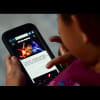Uncovering internet addiction

Does the idea of going to bed without watching reels sound impossible to you? Are you the sort of person whose hands immediately reach for the phone at the slightest hint of boredom? Do you feel bored when having to eat a meal without watching YouTube? Congratulations, you are gradually riding the slippery slope that is internet addiction.
What is internet addiction?
According to research from 2016 by the American research company Dscout, the average person touches their phone over 2,600 times a day. People on average spend 6.5 hours on the internet daily, as per the Global Web Index. However, individuals between ages 16 and 24 spend an additional 2.5 hours online compared to those aged 55 to 64. Interestingly, a joint study by the University of California and IVO Addiction Research Institute classifies Internet Addiction Disorder with criteria including addiction lasting at least three months, with at least six hours of nonessential internet usage per day. This implies that, by today's standards, the average person is unknowingly an internet addict.
The ticks and tendencies
Internet addiction has become synonymous with the digital age. Everyone from Gen-X to boomers has succumbed to its grasp. Does this sound familiar: Wake up, open Instagram, scroll through stories, reply to texts, open Facebook, repeat, switch to TikTok, watch a barrage of 15-second videos. Before you know it, an hour has passed since you awakened. You grab breakfast, and open YouTube to accompany your meal. Check socials every five minutes, send a few snaps, and go down a Reddit rabbit hole researching a random topic you'll never think about again. Go home, turn on Netflix while having dinner, mindlessly scroll your phone even with the TV on, then finally call it a night after a couple more reels.
This is the quotidian life of many young adults, one of contiguous stimulation. Reaching for the phone has become as integral a part of human reflexes as flinching at a sudden advance. During hangouts, face-to-face interactions are interceded by a constant need to post stories, check texts, and scroll the newsfeed. The same can be said for most outdoor activities, whether you're at a concert or a trip. A veil that once existed over a person's private life has become extinct due to the rise of an exhibitive lifestyle. Even out in the world, the internet has become an extraneous limb that we have to carry, or rather, have become chained to.
The pitfalls
You are not entirely at fault here. Companies spend millions trying to hack human psychology to ensure you spend as much time as possible on their platforms. User interfaces capitalise on the blind spots of the human subconscious. When you enter Instagram, Netflix or YouTube, you have no logical endpoint indicating that your utility of the app has been maximised and that you should exit; the feed keeps renewing, and you keep scrolling down or playing the next episode.
The homepages on video streaming platforms are stimulating enough to trigger mild epilepsy, with designs that fit the most amount of content in the least amount of space to increase the chances of hooking you into one of them. And as soon as one video ends, the platform hits you with a barrage of related content to keep the cycle going. The short length of reels and stories tricks users into thinking they'll be more economical with their time while still being entertained.
So what should you do?
The internet is best used with a clear intention in mind. Clear goals can sound like: "I need to reach out to friend X to say Z" or "I need to download X to accomplish Y". Most times, people wander into the internet in a fugue state, not remembering what brought them there in the first place. Like a nomad, we switch from site to site, not accomplishing any important task nor revelling in some great pleasure. It's an underwhelming midpoint that's the worst of all worlds.
If entertainment is what you crave, then plan out your preferred entertainment instead of winging it on the net or Netflix after work or school every day. Allocate a certain amount of time at the end of the day to "actively" unwind and do nothing else. This can be anything from a gaming session or a movie to actual in-person hangouts (phones off limits!). The goal is to be deliberate.
If you feel like your phone habits have been off the charts, then phone fasting might be a good way to cleanse your system. Ditch your "smart" phone for a buttoned alternative and stick to it for two weeks. If you're bored, make a deliberate effort to remain so. Unbeknownst to many, boredom is instrumental to the brain's creative and problem-solving ability. You can replicate the meditative Dutch practice 'niksen,' where they actively allow themselves to do nothing and process emotions as they pass.
After the withdrawal pangs have passed, you will feel like you haven't missed much. Your brain will adjust to the lack of constant stimuli. You may resort to your smartphone, but this time, allow yourself on social media only periodically, say, twice a week in the evening, and only use YouTube if you have a particular topic you want to research. Ensure that your bed is a 'No Surf Zone', keeping the phone in a dedicated space.
Do your brain a favour and learn to enjoy the world of literature if you don't already—a slower form of entertainment that your brain will benefit from. Practice journaling to keep track of emotions and ideas that pop into your head. These can be useful when experiencing an urge to surf. Alongside it, intentionally opt for more activities that require physical engagement, such as sports or sightseeing. Dopamine release followed by pursuit is quintessential to a healthy brain.

 For all latest news, follow The Daily Star's Google News channel.
For all latest news, follow The Daily Star's Google News channel. 




Comments